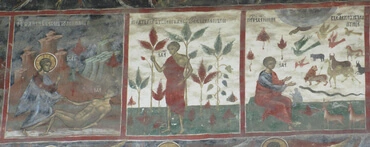20
Ja Adam antoi kullekin karjalle, ja taivaan linnuille, ja eläimille maan päällä heidän nimensä. Mutta Adamille ei löytty apua, joka hänen tykönänsä olisi.
20
Ja Adam antoi kullekin karjalle, ja taivaan linnuille, ja eläimille maan päällä heidän nimensä. Mutta Adamille ei löytty apua, joka hänen tykönänsä olisi.
SWORD version by Tero Favorin (tero at favorin dot com)
Durch Brian David (maschinell übersetzt in Deutsch)

Der Herr hatte den Menschen der Urkirche (Adam) die geistigen Gaben ihres himmlischen Zustandes gezeigt, ihren Zustand der Liebe zum Herrn. Er hatte ihnen die liebevollen Zuneigungen (Tiere des Feldes), die inspirierten Gedanken (Vögel des Himmels) und das Leben gezeigt, das ihr geistiges Dasein erfüllte (Lebewesen). Und die Menschen erkannten die Natur dieser Dinge und woher sie kamen (sie gaben ihnen Namen).
Aber das war nicht genug. Die Menschen wollten sich selbst führen und das Leben als ihr eigenes empfinden. Sie wollten nicht mehr im höchsten himmlischen Zustand sein.
(Verweise: Himmlischen Geheimnissen 142, 143, 144, 145)
28. Will and Understanding
We have two abilities that make up our life, one called will and the other understanding. 1 They are distinguishable, but they are created to be one. When they are one, they are called the mind; so they are the human mind and it is there that all the life within us is truly to be found.
Fußnoten:
1. The Latin words here translated "will" and "understanding" are voluntas and intellectus, respectively; the latter is also sometimes translated " intellect. " In Swedenborg's use, however, intellectus has a somewhat broader connotation than understanding or intellect has today, one more consonant with the use of the Latin word in the system of the Scholastics. For example, in the philosophy of the major figure of Scholastic thought, Thomas Aquinas (1224 or 1225-1274), which underlies the terminology of much of philosophical language up to and including Swedenborg's time, intellectus encompasses all of what we associate with the faculties of mind, not only the capacity to reason and understand, but the capacity to perceive ideas in the abstract, as well as the mind's ability to be aware of itself (Shallo 1923, 115-116). The complementarity of will and intellect is also something Swedenborg shares with Scholastic thought. For an overview of the relationship between the will and the intellect, see True Christianity 397; for a detailed and extensive account of their interaction as analogous to that of the heart and the lungs, see Divine Love and Wisdom 394-431. For discussion of the related term "intellectual truth," see note 1 in New Jerusalem 26 above. For further discussion of the will and the understanding, see note 1 in New Jerusalem 33 below. [GFD, RS, JSR]